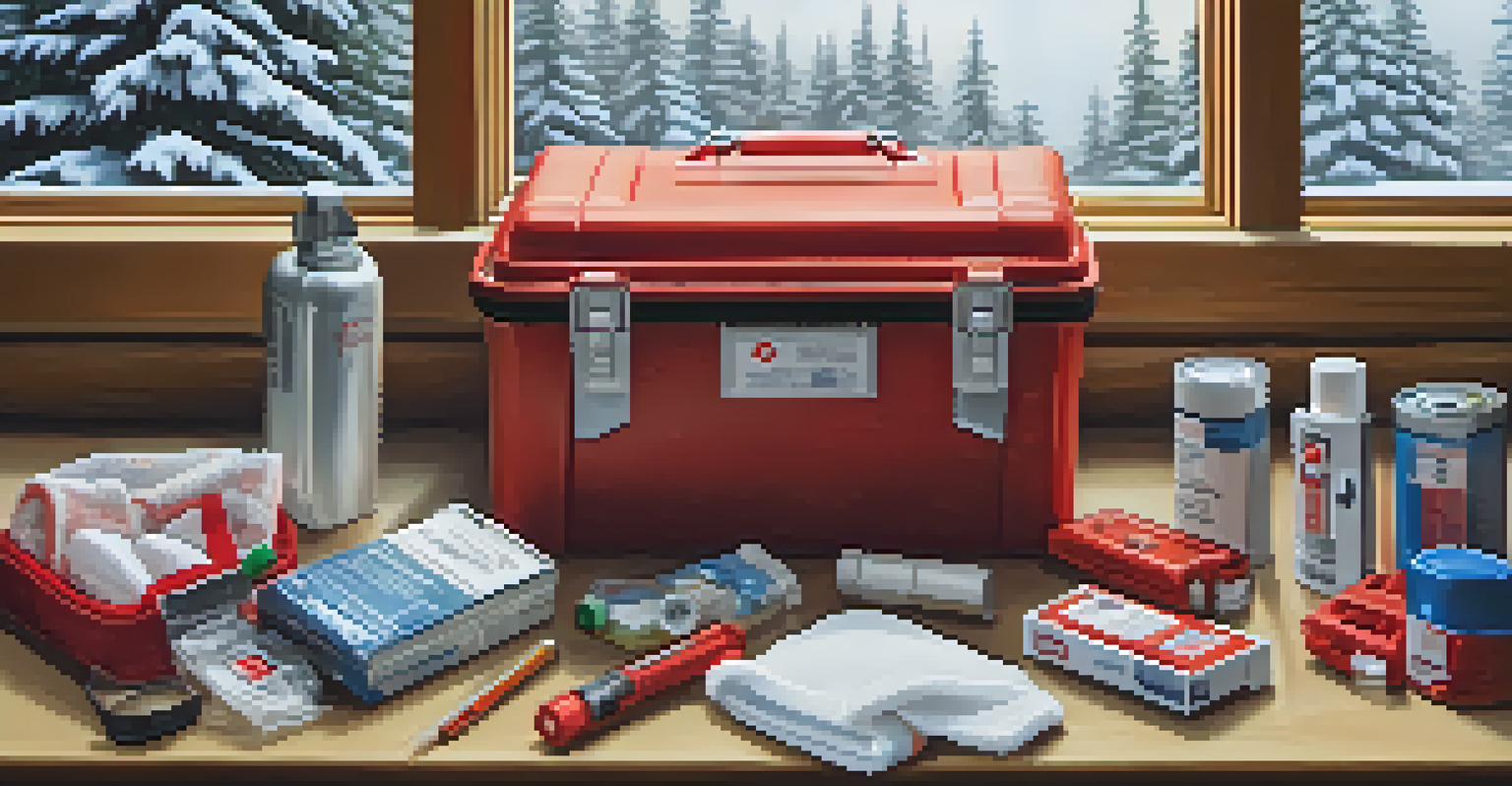Seasonal Home Safety Checks: A Must for Homeowners

Understanding the Importance of Seasonal Safety Checks
Seasonal home safety checks are essential for maintaining a safe living environment. Just like we change our tires with the seasons, our homes need routine inspections to ensure everything is functioning properly. Neglecting these checks can lead to serious safety hazards and costly repairs down the line.
An ounce of prevention is worth a pound of cure.
By conducting seasonal checks, homeowners can identify potential issues before they escalate into more significant problems. For instance, a small leak in the roof might seem insignificant, but if left unchecked, it could lead to extensive water damage and mold growth. Regular assessments can provide peace of mind and save you money in the long run.
Moreover, seasonal checks can help you adapt your home to changing weather conditions. For example, winterizing your home in the fall can prevent pipes from freezing, while checking your smoke detectors in the spring ensures they’re ready for summer barbecues. It’s a proactive approach that contributes to the overall safety and comfort of your home.
Spring Checks: Preparing for Warm Weather
As winter fades away, spring is the perfect time to perform essential home safety checks. Start by inspecting your roof for any damage caused by snow or ice. It’s also wise to clean out gutters to ensure proper drainage during spring rains, preventing water from pooling and causing leaks.

Next, check your exterior for any cracks or gaps that could let pests enter. As the weather warms up, insects and rodents become more active, and a thorough inspection of doors, windows, and foundation can help keep unwanted visitors out. Seal any openings you find to maintain your home’s integrity.
Seasonal Checks Prevent Major Issues
Conducting regular seasonal safety checks helps identify and address potential home issues before they escalate into costly repairs.
Finally, don’t forget about your smoke detectors and carbon monoxide alarms. Test them to ensure they’re functioning correctly and replace batteries if necessary. Spring is a great time to remind yourself of these vital safety devices and ensure your family stays protected.
Summer Checks: Keeping Cool and Safe
Summer brings its own set of safety concerns, especially with the use of air conditioning units. Be sure to clean or replace filters to maintain optimal performance and prevent allergens from circulating in your home. A well-functioning AC unit not only keeps you cool but also contributes to better indoor air quality.
Safety isn't expensive, it's priceless.
Additionally, take the time to inspect your outdoor spaces. Check deck railings and steps for stability, ensuring they can support the weight of family and friends during backyard gatherings. It’s a simple step that can prevent accidents and ensure everyone enjoys your outdoor oasis safely.
Lastly, summer storms can be unpredictable, so inspect your home’s exterior for any loose shingles or siding that could be damaged during severe weather. Taking the time to secure your home against summer storms can save you from significant repair expenses later on.
Fall Checks: Preparing for Winter Weather
As the leaves start to change color, it’s time to prepare your home for the colder months ahead. Start by checking your heating system to ensure it’s in good working order. Schedule a professional inspection if necessary to avoid any surprises when the temperature drops.
Don’t forget to inspect your windows and doors for drafts. Sealing these gaps helps improve energy efficiency and keeps your home warm during winter. Simple weather stripping can make a significant difference in your comfort and energy bills.
Involve Family in Safety Practices
Creating a home safety checklist and involving your family fosters responsibility and promotes safety awareness among all members.
Lastly, remove any debris from your gutters and downspouts to ensure proper drainage. Clogged gutters can lead to water damage and ice dams during winter, so it’s crucial to keep them clean. Taking these fall precautions will help your home weather the winter storms ahead.
Winter Checks: Ensuring Safety Amid the Cold
Winter can be harsh, and your home needs to be well-prepared for the cold. Start by checking your insulation levels in attics and basements. Proper insulation helps retain heat, making your home more comfortable while saving on energy costs.
Next, inspect your home’s plumbing for any signs of freezing or leaks. Insulated pipes are crucial during winter to prevent bursts, which can lead to significant water damage. Consider letting faucets drip during extremely cold nights to relieve pressure and prevent freezing.
Lastly, ensure your emergency kit is stocked and ready. Include items like flashlights, batteries, blankets, and basic first-aid supplies. Winter storms can sometimes lead to power outages, and being prepared can make a challenging situation much more manageable.
General Safety Checks: Essential Year-Round Practices
While seasonal checks are vital, there are general safety practices that every homeowner should adopt year-round. Regularly test smoke detectors and carbon monoxide alarms to ensure they’re functioning correctly. Establish a routine where you check these devices monthly to keep your home safe.
Another critical area to focus on is your home’s electrical system. Look for any frayed wires or signs of overheating, especially in areas where devices are frequently plugged in. If you notice anything unusual, it’s best to call a professional electrician to address potential hazards.
Long-Term Benefits of Routine Checks
Regular safety checks not only enhance your home's value and energy efficiency but also contribute to your family's overall well-being.
Finally, keep your first-aid kit stocked and accessible. Regularly check expiration dates and replenish supplies as needed. Being prepared for minor emergencies can provide significant peace of mind and help you respond effectively when needed.
Creating a Home Safety Checklist for Your Family
To make seasonal checks easier, consider creating a home safety checklist tailored to your family’s needs. Start by listing out all the areas in your home that need attention each season. This can include tasks like checking smoke detectors, inspecting the roof, and cleaning gutters.
Involving your family in these checks can also promote safety awareness. Assign age-appropriate tasks, allowing children to learn about home maintenance while contributing to keeping the home safe. This not only fosters responsibility but also creates a sense of teamwork.

Finally, keep your checklist in a visible location, like the refrigerator or a family calendar. Regularly reviewing the list helps ensure that nothing gets overlooked. With a comprehensive checklist, you’ll find it much easier to stay on top of home safety throughout the year.
The Long-Term Benefits of Regular Safety Checks
Regular seasonal safety checks offer numerous long-term benefits for homeowners. By proactively addressing issues, you can significantly extend the lifespan of your home’s systems and structures. This not only saves money on repairs but also enhances your home’s overall value.
Additionally, maintaining a safe and secure environment contributes to your family’s well-being. Knowing that your home is well-checked and cared for allows everyone to feel more relaxed and comfortable. It’s all about creating a nurturing space where memories can be made.
Seasonal Checks Enhance Home Safety
Conducting seasonal safety checks helps identify potential issues early, preventing costly repairs and ensuring a safe living environment.
Finally, regular checks can also improve your home’s energy efficiency. By ensuring that systems are functioning optimally, you can lower your utility bills and reduce your environmental impact. It’s a win-win situation that benefits both your wallet and the planet.